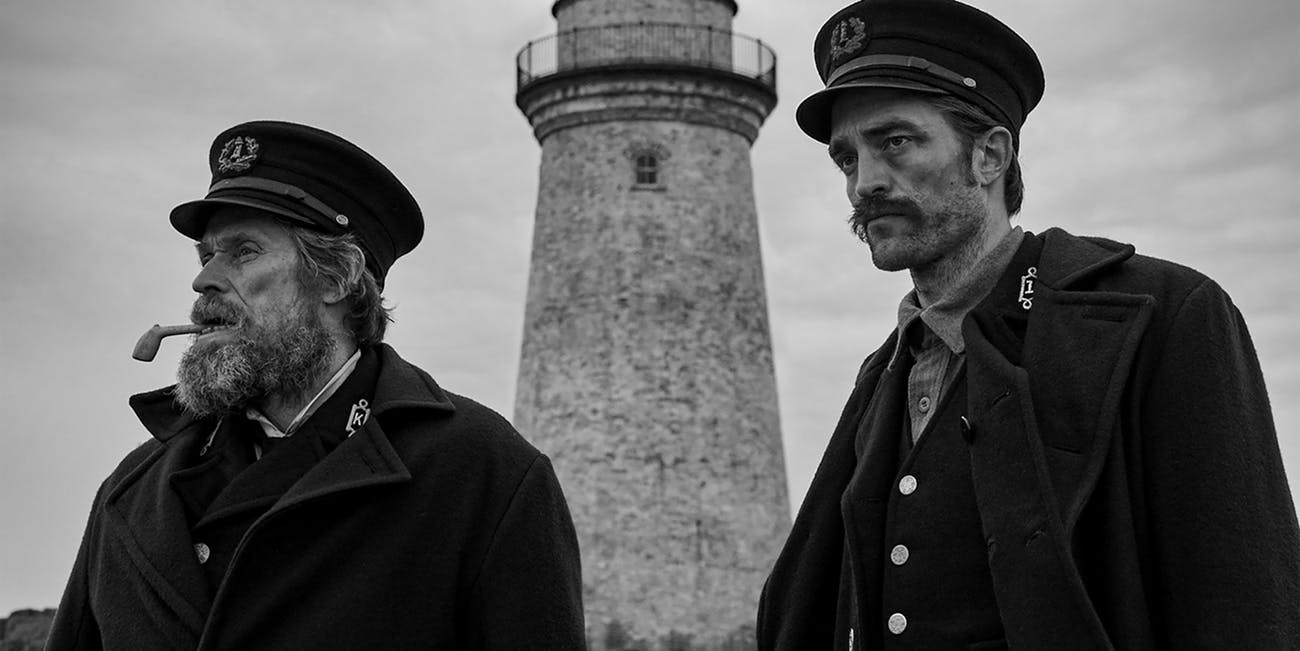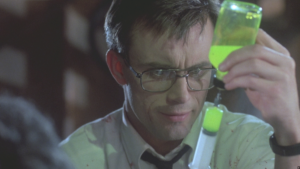It is the sea from which all life ultimately originated, when, one day, from out of the primordial ooze and shallow coastal waters emerged an amphibian creature whose curiosity brought it to land. And this birthplace from our impossibly distant past continues to exert on us a powerful and mysterious hold, the great yonic symbol of all humanity. It is “the black and seamless sea,” wrote Cormac McCarthy, where “stars are drowning and whales ferry their vast souls.” It is the sea which God summons to drown the wickedness of the world for forty days and nights. And it is the sea which on all sides encloses our protagonists here, pitting the two in a primeval battle of wills and wits, and which threatens to devour them entirely, if they don’t first devour each other.
Set on a remote New England island sometime in the late 19th century, the film stars Willem Dafoe as Thomas, a comically craggy and cantankerous lighthouse keeper and Robert Pattinson as his assistant, Ephraim. Their routine is monotonous: Thomas drinks to blind excess and bellows commands; Ephraim obeys and endures. Eventually their tempers run hot and explode in uneasy, comic violence, before unsteadily settling down a while longer. All the while the rain and waves beat upon them ceaselessly.
The lighthouse holds a fascination for each man. Thomas speaks of it in mystical, reverent, even religious tones: he tells of a former underling, driven mad, believing there was “enchantment” in the light. Thomas insistently adheres to superstitions, rituals, private and public orders meant to keep the chaos of the void at bay. He jealously guards his watch, refusing to let Ephraim share the responsibility, or even to let his keys out of his sight. Ephraim’s desire grows ever more burning. He begins to have nightmares, which become visions, which become…
Eggers’ debut feature, The Witch, established him as an obsessive acolyte of period detail; here, he pushes his throwback aesthetic even further, demonstrating his knowledge as a student of silent- and early-sound-film iconography. Besides his ultra-narrow frame (1.19:1) and meticulously lit, high-contrast B&W cinematography, it’s Eggers’ exploration of Pattinson’s and Dafoe’s faces which most readily hearkens back to silent film, their expressions often thrown into harsh and unforgiving detail as they contend to keep their wits about them in the face of punishing, existential absurdity. The performances, and expressions, are often pitched at the level of comic hysteria: eyes bugged, teeth bared and gnashing, spittle flecked on lips or flying in the air, giving the two a feral primacy (compounded by the filth, muck, blood, shit, and jizz in which they continually wallow). Psychological realism is cast aside in favor of intense, surreal horror. Thomas’ dialogue favors absurd, poetic grandiosity; Ephraim is more unhinged, less eloquent in his rage (though occasionally cuts to the heart of it: “You sound like a goddamn parody”).
Eggers’ theology is likewise old-testament: these men are bound by sin and seek redemption for which they hold little hope, and in their despair, they turn violent. Alone at the edge of the earth, far away from God and man alike, each attempts by sheer force of will to establish his dominion over this modest piece of Creation, neither knowing nor caring that God has abandoned them. In his absence, they rage — at him but mostly at each other. The relationship between the two men is a portrait of masculinity in all its excesses: their violence is so intimate, so heated, so personal that it often threatens to (and occasionally does) spill over into sheer homoeroticism. (The lighthouse itself, according to Pattinson, was described in the script as “a giant penis.”) Ephraim compulsively masturbates to a mermaid figurine which he discovers stuffed into his mattress; Thomas spends each night bathing naked in the glow of the lighthouse lamp. Each is ultimately driven mad by jealousy, desire. Ephraim sees visions of mythical beasts, which may or may not prove real.
Above all, where the film succeeds is in its sheer tactility, the pervasive sense of physical punishment and exhaustion: the intensity of the two leads, the punishing elements, the tight and harshly-lit cinematography, the claustrophobic staging, all combine to convey the sheer emotional intensity of the experience. The two men are inescapably bound to end violently at each other’s hands, by nature of the film’s construction, which turns the screws on them ever tighter until… For their own parts, Dafoe and Pattinson are game for all the abuse Eggers could offer: perhaps in an act of conscious myth-making, Pattinson made light of the torturous conditions of the set, meant to stoke the flames of their performative intensity.
In myth, it is Prometheus who is credited with creating humanity, by stealing the fire of the gods. For his transgression, he is punished for all eternity. Here, these men are undone by their own attempts to claim dominion over a cursed earth, drowned in sin. They seek the enchantment of the light and what they see is their own undoing. You can never return home: to be born is to begin the process of dying. To be human is to be cursed to know that. But the sea is indifferent. It rolls on “as it rolled five thousand years ago.”


